It’s a known fact that work sucks. I don’t particularly care what you’re doing for a living, if it hasn’t gotten old yet — it will. Or so I am told by many retired elderly men. Of course, the term ‘work’ itself seems to have to do a great deal of work of its own. It’s a tired term, used a half-dozen different ways or more. A journalist ‘works his angle’. A machinist works at the factory, punching a clock for his hours. A Saint performs good works. ‘Working girls’ walk the street. Married couples work on their marriages, and individuals ‘work on themselves’. Gardening is a form of work – albeit often enough a joyous one. And yet the phrase “work sucks” is a phrase with universal recognition. This is because when we say work, we are most often talking about wage labor, and at that, wage labor performed under the duress of bills and expenses which cannot be ignored. The indignities of this conditon pile up, and for all but the most stolid penitents of the workplace, this ‘piling up’ generates a haggard bitterness over time. Yet full-time wage labor is generally understood to be a necessary evil, lest we should want to become poor.
It’s also generally understood that poverty sucks. The tight paycheck-to-paycheck race, for those who’ve lived it, is remembered bitterly, as is the welfare office. The eternal no breaks the spirit, the constant admission that “we can’t afford it” bites down and induces sorrow. Poverty forces a denial of the self, not as a form of edifying penance, but as an exhausting humiliation. I think poverty is particularly challenging for men, as it subsumes their ability to provide, to decide, to create and protect. It also leads a woman to feel the most dreaded feeling in the feminine palette: insecurity of the hearth. The poor family must simply accept whatever grim fate befalls them, be it a stiff draft through the cracks in the windows, or a leaky roof, or a repossessed car. That is, until father can find work — and in short order, he finds himself in break-rooms and pubs where gruff men suck down cigarettes and issue the timeless proclamation that work sucks.
Anyone who has worked or experienced real poverty can probably attest to these basic suppositions; while they can vary considerably in their severity, all working people and all poor people feel a sense of something unpleasant and even humiliating about their condition. And most workers will eventually be poor — remember 2008? — and most poor folks will eventually work. Both conditions have something in common, and I find this commonality little-discussed: Both wage labor and poverty deprive a human being of agency. The feeling a trucker gets when being ordered to work on Christmas Eve has a great deal in common with the feeling an unemployed carpenter gets when his bank card is declined on a hot date. Something external is holding your life prerogatives hostage in real time — and there isn’t a damn thing you can do about it.
The worker could quit, of course, but then he is on his way to poverty quickly unless he finds another (likely similarly low-agency) job. The poor man can also quit: He can turn to crime, and inevitably in that case — jail. In actual fact, the human capacity to grin and bear it may be one of the most important ‘glues’ holding human civilization together. If we all simply 'lost it’ and quit, stepping into the lower rung for our lack of resolve to grit through whatever humiliating incursions on our agency are dished out by our station in life, we all might wind up in prison — but with no guards, the prison doors would open, and life in the human sphere of planet earth would simply cease. The cynic may remark through clenched teeth that yes — that’s life. It sucks. You work doubles, you pay your taxes, and then ya die.
The woodchuck watches as these thoughts wash through the minds of the strange humans at the gas station near his hole; he is listening to the half-utterances of poor men as they find their cars cannot turn over or start, he watches the cashier scroll through Tik Tok and vape compulsively. Spent EBT cards litter the snow, and wealthy contractors throw back Vicodin in their brand new F-350’s. When you are a woodchuck, you simply observe what you see — some of it is good, but a surprising amount of human society looks rather grim. I know this because my own people are woodchucks, and as a matter of fact my Uncle Andy is the self-crowned King of the Woodchucks.

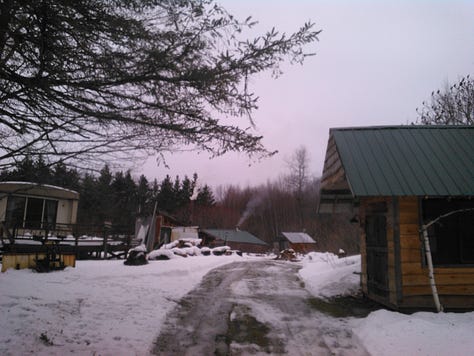
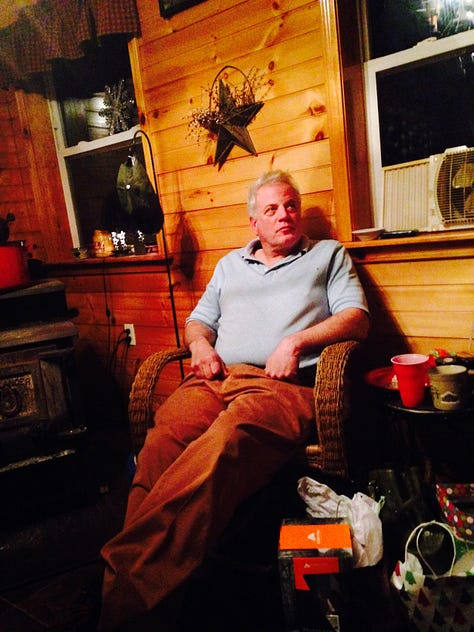
Northern New York State is a strange place; completely overshadowed by the abnoxious city which shares the state’s name, ‘deep upstate’ is obscure and essentially unknown. Having grown up there, I have struggled when traveling to adequately field inquiries regarding “where I come from”. If I say New York, they think Times Square. If I say “no, no, it’s sort of like Vermont but grittier and less quaint”, folks will often simply think I’m a little strange. They seem to figure that that’s a real weird way to describe Time Square (or somewhere close to it), though my town is nearly six hours from that wretched place.
Because we are not really New Englanders, not really Upper Midwesterners, and possess only the weakest connection to Appalachia, our identity is as vague as the light issuing through the constant overcast blanketing our hills. What little press we do get is overwhelmingly about shocking poverty or the reality that we’ve been hemmorhaging population for decades. Even The Simpsons did a bit on us which presented upstate as a squalid and forgotten shithole. And frankly, I don’t mind — keeps the riff-raff out.
The culture is also avowedly ‘rednecky’, albeit our lack of an uncomplicated claim to a particular regional breed of powhitetrash makes the usual terms of description somewhat inadequate. Alabama has their rednecks and crackers, Vermont their swamp Yankees, West Virginia their hillbillies. My Uncle understood this, identified with none of these names, and has instead referred to himself as a woodchuck for many decades. Whether the term is older than he is is not known to me, but I do know that this term fits us beautifully.
This is because the woodchuck is frugal and practical; he is hardly fashionable and keeps to himself. The fat of the land becomes the fat of his own flesh rather easily. He does not disturb his preferred patterns of idleness with excessive toil, instead opting to lazily graze on the chickweed and spring clover. To watch him stroll through the pasture is to watch an animal with all the sensibilities of a man so thoroughly geriatric that he knows he can get away with anything; he samples the soup, so to speak. He gnaws at the foliage with bravado, fritters away pieces of this and that out of mere curiosity. The hunter barely notices him, much less preys upon him. When winter comes, he sleeps mostly, only occasionally popping his head up drowsily, “to check the weather”. What he does in his burrow when he is not sleeping, we do not know, but if Uncle Andy has anything to say about it, he’d reckon he’s in there counting his pennies and reading old copies of National Geographic from the 70’s pilfered from a library dumpster. That — and cackling at his own perfect and slothful fortune.
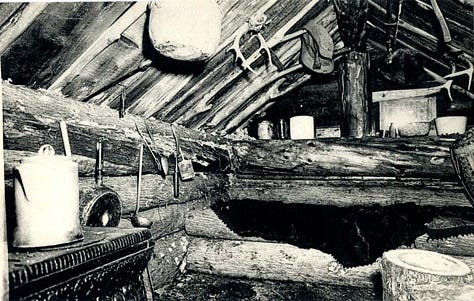

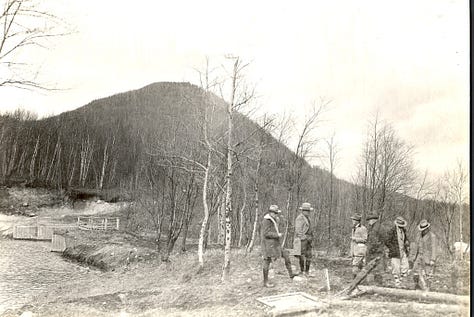
Uncle Andy has worn the fur of the woodchuck all his life: it has been his mantle. In the 90’s, he was banned from Ponderosa Steakhouse for life — for gross abuse of the buffet. He, a man always angling to “get his money’s worth”, consumed so much chicken one fine lunch hour that the cook — overworked strictly on his behalf —became enraged. When Uncle Andy piled up all the bones into a great mountain on a single plate, he poked a toothpick with a paper American flag at its summit — and this was the last straw. The cook chased him off, his name was written down, and never again would the woodchuck king stroll in for a lunch buffet. These are the hazards of the woodchuck’s insistence that he always must get his money’s worth.
When contemplating the ways in which both poverty and wage labor deprive their subjects of agency, I must highlight the example of the woodchucks of old upstate. By their own shrewdness, these woodchucks — and there are many, some 45 of them I’m related to — weave together whatever cream they can pull from both poverty and occasional work to create a style of living which offers them a high degree of agency. Of course, every aristocrat has rules which he must observe if he is to maintain his position, and the woodchuck is no different. They are simple:
Frugality is to be practiced by default; if expenses are as low as possible, wage-labor-under-duress can be minimized.
As a corollary to the first rule, one must always ask whether the good earth can, with a bit of ‘playful laboring,’ fulfill a given household need.
Keep that W2 small, and formal work activities to a minimal level. Or: build your life such that this is the default. If you make more, keep more of it.
The conventions of society outside the woodchuck’s burrow are to be entirely ignored, in favor of a bold self-ownership and hearty laughter in the face of the niggling naysayers.
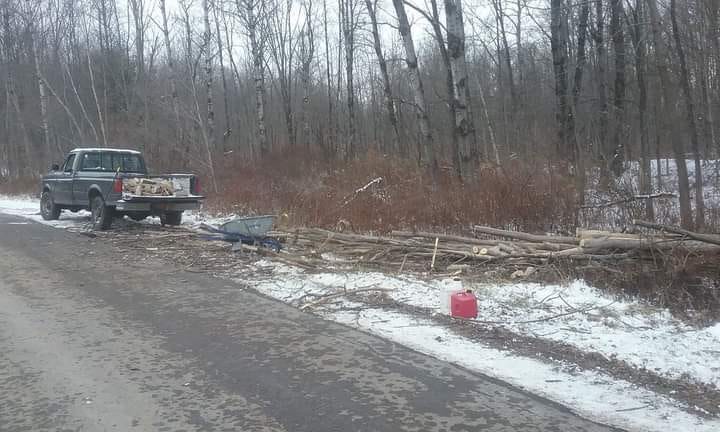
On this fourth point, Uncle Andy would go so far as to defend his use of a ladies stocking as a belt, citing the outrageous price of belts at the Salvation Army. He may go this far, and so may you — but I do not. This is the beauty of the woodchuck’s life; he is the master of his fate. It makes for a fun pasttime of comparing notes with your woodchuck neighbors. But the default is always one of skepticism (if not active scorn) toward the allegedly requisite trappings of life forwarded by polite society.
One cannot gain such haughty confidence without a warm burrow for the winter. The woodchuck is a natural Jeffersonian; his burrow is his fortress, it is a citadel of one or of ten (depending on whether the burrow is to Mrs. Woodchuck’s liking). The security of his home is the backbone of his willingness to experiment with how he stocks the shelves and fills the furnace. And to you, reader, I will offer this advice: secure for yourself the cheapest housing you can imagine as soon as possible. Be flexible on where you are willing to go, exploring forgotten and obscure regions, ‘shitty towns’ and rusting villages, dirt-road compounds which can be picked up for a song, owner financed by some red-eyed and moonshine-drunk grandpa in the happy hills. Find this, bite down on it, and aggressively pursue outright ownership as rapidly as you can muster the funds to do so. No way to squirm around it — this takes flexibility and work. But once done, season after season you’ll reap perennial idleness and the ecstatic hilarity of half-employment.
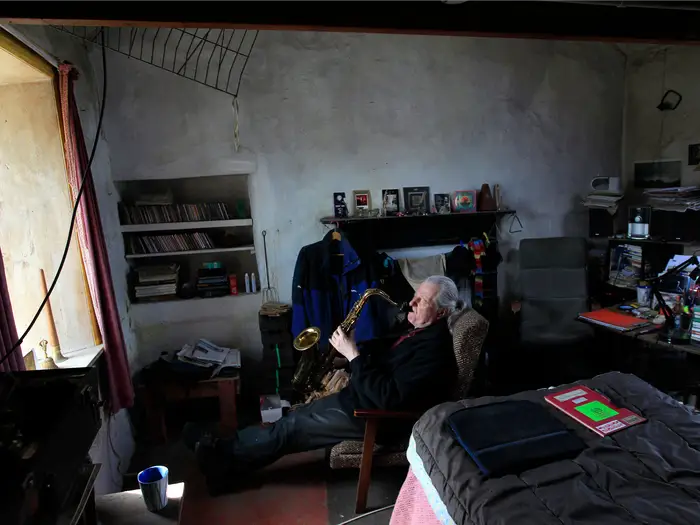
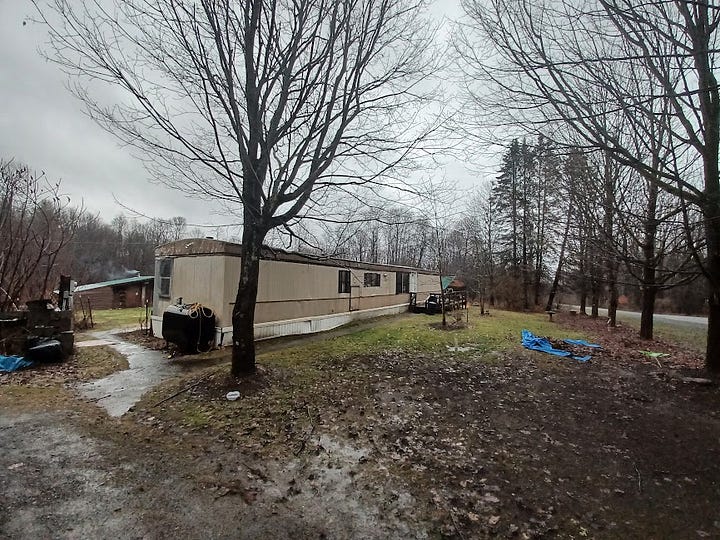
There are a litany of locations on the map where such a thing is possible as soon as you’ve shedded any loyalty to the notion that vapid, expensive trivialities like ‘nightlife’ and ‘a good art scene’ matter or ever did. If you’re reading this, you probably are already there. Get comfortable with taking up residence in an obscure place, settling in, and entertaining yourself. Good neighbors can help — that’s essentially why I’m writing this, on the notion that perhaps one or two of you would be the sorts of people I wouldn’t mind sharing a town with. I’ll soon be writing in greater depth on the sorts of regions that are worth settling, markets that offer the greatest value propositions, and a broader criteria for where to settle, but for now allow me to suggest that housing doesn’t need to run you $3000 a month — not even $600 a month. Mortgages as low as $200 are a well-known phenomenon; outright owners can get away with monthly tax and insurance costs below $100 a month! In 2023 USA, the dream is still alive. It’s just a matter of sobering up from the habit of chasing ‘relevant’ places and high salaries (that get eaten up by the rent check in top-dollar towns).
Once established, straightaway every measure ought to be taken to shave down expenses in every category. Burning wood from your own lot is cheaper than fuel oil. Gardens yield well enough with a little effort. The less you leave your village, the less of a substantial automobile you need. If you’re a woodchuck genius, you might situate yourself a mile outside a reasonably-sized town that threatens not to grow much — opting to forego a motor vehicle entirely. These are simple examples I offer mostly to outline a philosophy regarding home economics; once you’ve embraced the simple dictums of the woodchuck, you obtain the freedom to use a bit of imagination in how best to keep the house warm and the belly full, that you may retain your agency as you go to work. In fact, you may get away with a part-time wage job — or less. I’ve seen it done to good effect even among family men, providing their home is owned outright and heated with wood.
For the complete evasion of work is not the aim; it would not even be desirable. To ‘render unto Caesar’ one’s fifteen or twenty hours of weekly wage labor is actually a joy; the woodchuck in the workplace is good for morale, as he strolls in more as a visitor than a captive, and with him be brings glad tidings. Yes, working away is his game, but his burrow is still warm and offers him luxuries unknown to his coworkers — who will either sneer at him for his idleness (see rule #4) or, somewhat astonished, ask how it was that he ‘retired’ at such a young age. As always; hilarity and guffawing at every step is the word of the woodchuck.
After all, if you aren’t guffawing and cackling — are you even living? The usurpation of agency found in our slums and offices won’t do, not for a man who loves God and the green earth. Nor will the bitter adage of ‘it is what it is’ suffice but for momentary chapters. So many of today’s ‘requisites’ are really obscene luxuries the likes of which would’ve been reserved for royalty not so long ago. We must ask ourselves what matters — cold cider with the neighbors, inspection of the local beaver dams, cherries on the gleeful branches, all glory to the Lord, hours-long morning wanders in the swamps and crick-beds, tearful sunrises and pine needle tea. One can only render so much unto Caesar — the cynicism which calcifies both onto the poor man and the worker ought to be foregone for a life of laughter. I exhort you to contemplate what you might do with a $400 mortgage, long mornings, a wood stove, and half a job. It’s more doable than you may have imagined.

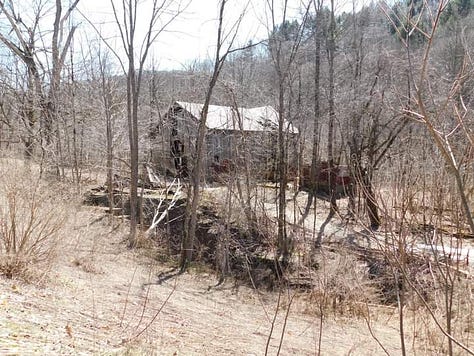





Great writing; prosaical in a way that seems to really highlight the already interesting content. It made me want to explore all the hidden little corners of redneck America, God bless it. Really enjoyed the piece.
I’ve crossed paths with many a “woodchuck”. I typically thought they didn’t care enough to try and better themselves. But now I’m not so sure. Maybe they had figured out all along. Thank you for a thought provoking read and changing my views on the humble “woodchuck”.